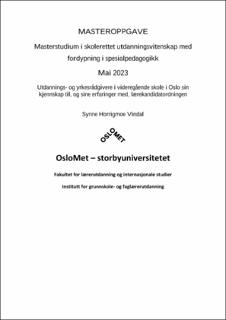| dc.description.abstract | Lærekandidatordningen er tema for denne avhandlingen. Fra utdanningspolitisk hold er frafall i videregående skole en stor bekymring. Studien tar utgangspunkt i utfordringen med frafall på yrkesfaglige utdanningsprogrammer i videregående skole og den varierende bruken av lærekandidatordningen som et tilpasset opplæringstiltak. Problemstillingen for studien er: Hvordan vurderer utdannings- og yrkesrådgivere i videregående skole i Oslo sin kjennskap til, og sine erfaringer med, lærekandidatordningen? For å svare på problemstillingen er en kvantitativ tilnærming med bruk av et spørreskjema valgt (vedlegg 4). Den kvantitative tilnærmingen er supplert med muligheter for å kommentere spørsmålene for å kunne få et noe dypere innblikk i bakgrunnen for de erfaringene og forståelsene som etterspørres. Dette åpner opp for et empirisk innblikk i hvordan rådgivere vurderer mulige tiltak for å redusere frafall gjennom å se nærmere på lærekandidatordningen. Forskningen som avhandlingen bygger på, viser en klar positiv sammenheng mellom elevenes motivasjon og deres skoleprestasjoner. Ordninger og tiltak for å tilrettelegge videregående opplæring for en stadig mer mangfoldig elevgruppe har blitt sett i lys av teorier om motivasjon, spesielt Deci og Ryans selvbestemmelsesteori og sosial kognitiv læringsteori (Bandura). Dette grunnlaget utgjør det teoretiske rammeverket for studien. Teori om kulturell kapital og skolen rolle i reproduksjon av ulikhet (Bourdieu) står også sentralt. Elever som begynner i videregående opplæring, har svært ulike sosiale bakgrunner og faglige forutsetninger for å mestre de kravene skolen stiller for å oppnå enten studie- eller yrkeskompetanse. Hovedfunn i studien viser at lærekandidatordningen vurderes som en viktig og verdifull ordning for å kunne gi et likeverdig tilbud til mestring, læring og utvikling i videregående skole. Det er imidlertid i elevens møte med skolen at retten til likeverdig opplæring får sitt faktiske innhold. Og utfordringen for skolen blir å sette lovens intensjoner ut i livet. Undersøkelsen viser at det eksisterer en rekke strukturelle hindringer som kan begrense elevers mulighet til å få en god og tilpasset opplæring gjennom lærekandidatordningen. Disse hindringene omfatter varierende kjennskap til ordningen, uklare kriterier for hvem som bør få sin opplæring gjennom ordningen, mangel på læreplasser og begrenset aksept for opplæringsløp mot kompetanse på lavere nivå enn studie- og yrkeskompetanse.
The apprentice candidate scheme is the topic of this thesis. From an educational policy perspective, high school dropout is a major concern. The study focuses on the challenge of dropout rates in vocational education programs in high school and the varying use of the apprentice candidate scheme as an adapted educational measure. The research question for the study is: How do educational and career counselors in high schools in Oslo assess their knowledge of, and experiences with, the apprentice candidate scheme? To answer the research question, a quantitative approach using a questionnaire has been chosen. The quantitative approach is supplemented with opportunities to comment on the questions to gain a somewhat deeper insight into the background of the experiences and understandings being sought. This allows for an empirical understanding of how counselors evaluate possible measures to reduce dropout rates by examining the apprentice candidate scheme more closely. The research on which the thesis is based, shows a clear positive correlation between students' motivation and their academic performance. Arrangements and measures to facilitate secondary education for an increasingly diverse group of students have been viewed in light of motivation theories, especially Deci and Ryan's self-determination theory and social cognitive learning theory (Bandura). This foundation forms the theoretical framework for the study. The theory of cultural capital and the role of schools in the reproduction of inequality (Bourdieu) is also central. Students entering secondary education come from highly diverse social backgrounds and have varying academic prerequisites to meet the demands set by schools to achieve either academic or vocational competence. The main findings of the study show that the apprentice candidate scheme is considered an important and valuable arrangement for providing an equal opportunity for mastery, learning, and development in high school. However, it is in the student's encounter with the school that the right to equal education receives its actual content. The challenge for schools is to implement the intentions of the law. The survey shows that there are several structural barriers that can limit students' ability to receive good and tailored education through the apprentice candidate scheme. These barriers include varying awareness of the scheme, unclear criteria for who should receive education through the scheme, a lack of apprenticeship positions, and limited acceptance of educational paths towards competence at a lower level than academic or vocational competence. | en_US |
